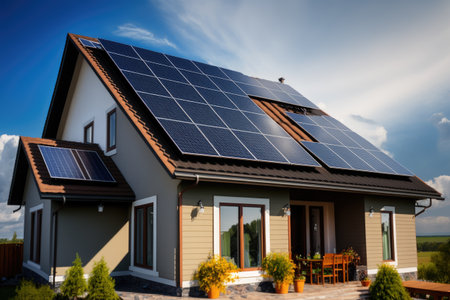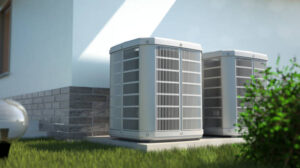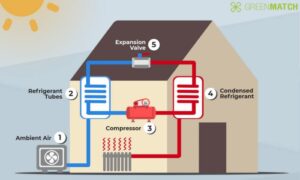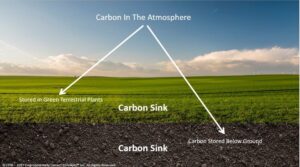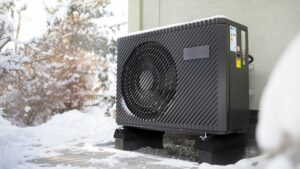Yes, heat pumps can be powered by solar energy, and combining these two technologies can enhance the sustainability and energy efficiency of a home. Here’s how the combination works:
- Solar Photovoltaic (PV) Panels: Solar panels convert sunlight into electricity. This electricity can be used to power household appliances, including heat pumps.
- Electric Heat Pumps: Heat pumps use electricity to transfer heat from one location to another, either from the outside to the inside of a house for heating or vice versa for cooling.
When you combine these two systems:
- Reduced Grid Dependence: By generating your own electricity with solar panels, you can power your heat pump without drawing as much electricity from the grid. This can result in lower monthly energy bills and greater energy independence.
- Lower Carbon Footprint: Both solar panels and heat pumps are considered green technologies. When a heat pump is powered by solar electricity, it results in a system with an even lower carbon footprint than when the heat pump uses grid electricity, especially if the grid electricity is generated from fossil fuels.
- Economic Incentives: In many places, there are tax credits, rebates, and other incentives for installing solar panels and heat pumps. Utilizing both can provide homeowners with financial benefits.
- Energy Storage Possibility: With the addition of a home battery storage system, excess solar energy generated during sunny days can be stored and then used to power the heat pump during nighttime or cloudy days.
However, there are some considerations:
- Initial Investment: The upfront cost of installing both solar panels and a heat pump can be significant. However, the long-term energy savings, potential increase in property value, and available incentives can offset these costs over time.
- Sizing: The solar panel system needs to be correctly sized to meet the energy demands of the heat pump and other household needs. This requires a comprehensive assessment by professionals.
- Maintenance: Both systems require some level of maintenance, though they are generally low-maintenance once installed.
- Geographical Considerations: Solar panels are most effective in areas with ample sunlight. While they still function on cloudy days or in less sunny regions, their efficiency might be reduced. Conversely, heat pump efficiency varies with climate and may be less efficient in extremely cold regions, though advancements in technology are continually expanding their viable range.
In summary, pairing heat pumps with solar panels can be an effective way to create an eco-friendly, energy-efficient home heating and cooling system. If considering such a combination, consulting with professionals in both the solar and HVAC sectors is essential for optimal system design and efficiency.

